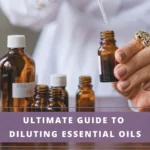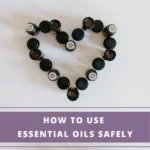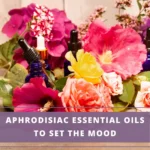As an Amazon Associate I earn from qualifying purchases. See Full Disclosure Here
Sinus infection is a common health problem that may be caused by viruses, bacteria, or allergens. The symptoms are similar to that of a cold and very often infections set in after a persistent cold. The symptoms can last for weeks and can be quite painful. Using home remedies for sinus infection can be very effective at clearing the sinuses and easing congestion, stuffiness and other painful symptoms.
 What is a sinus infection?
What is a sinus infection?
A sinus infection, also known as sinusitis, is an infection of the lining of the sinuses. Sinuses are air-filled pockets or cavities in the facial bones that form the top of the respiratory tract.
There are multiple such pockets located in different areas of the head near the nose and eyes. They are named after the bones that provide their structure.
– The frontal sinuses are located above your eyes.
– The sphenoidal sinuses are located behind your eyes.
– The ethmoidal sinuses are located between your eyes.
– The maxillary sinuses are located below your eyes. This is the largest sinus cavity and the one most susceptible to becoming infected.
All sinus cavities are connected to your nose.
When the sinuses are clear, mucus drains easily from the nose, clearing out dirt and bacteria from the nasal passages.
When the sinuses get filled with mucus, the excess mucus buildup creates a moist, stagnant environment that’s conducive for bacteria, viruses, and fungi to thrive. This causes the tissue linings to become inflamed and block the air-filled spaces.
The inflamed and blocked sinuses are what cause sinus infections or sinusitis.
What Causes a Sinus Infection?
Sinus infections may be caused by anything that stops the sinuses from draining, resulting in mucus buildup. Viruses, bacteria, and allergens are the top causes of sinus infections.
Viral sinusitis is the most common and typically starts with the common cold. Bacterial sinusitis is generally caused by exposure to certain bacteria and allergic sinusitis is caused by exposure to allergens such as pollen, mold, dust, or pet dander.
Symptoms of Sinus Infection
The most common and notable symptoms of a sinus infection are facial pain and pressure. The exact location of the pressure will depend on which sinuses are blocked.
Infection of the maxillary sinuses will cause pain in the forehead area, while infection in the other sinuses will cause tenderness on the bridge of the nose or under the eye area.
Nasal congestion, another common symptom of sinusitis, can make it difficult to breathe through the nose.
Other sinus infection symptoms include postnasal drip with mucus dripping down the back of the throat, headache, and a decreased sense of smell and taste.
Severe infections may also cause green nasal discharge, fatigue, bad breath, coughing, and fever.
Although some of the symptoms of sinusitis are similar to that of a common cold, the big difference is how long those symptoms linger. A cold generally lasts for a few days. On the other hand, sinusitis symptoms can last for as long as 10 to 15 days. Chronic symptoms can last for 12 weeks or even longer.
Using home remedies for sinusitis symptoms during the early stages is key to preventing the infection from becoming chronic. Without any early remedial measures, the symptoms are more likely to persist and become even more difficult to treat.
12 Natural Home Remedies For Sinus Infection Relief
Using natural home remedies for sinus infection relief offers a few compelling benefits over traditional medications. They are safer, less expensive, and have fewer side effects. Natural home remedies are also more accessible and can be used in the comfort of your own home.
These are 12 of the most effective natural home for sinus infections.
1. Steam Inhalation
 If you’re looking for the fastest way to get rid of a sinus infection, this is it. Steam inhalation is the most effective of all home remedies for sinus congestion.
If you’re looking for the fastest way to get rid of a sinus infection, this is it. Steam inhalation is the most effective of all home remedies for sinus congestion.
To use steam for sinus infection relief, fill a bowl with boiling water and add a few drops of eucalyptus oil to the water.
Place a towel over your head and breathe in the steam for 10 to 15 minutes.
As you inhale, the steam thins the mucus, which helps to unblock the sinuses and clear the nasal passages. This relieves the congestion so you can breathe better.
You can inhale steam by itself but adding eucalyptus oil makes it even more effective. Eucalyptus essential oil has powerful anti-inflammatory and antibacterial properties, which help to kill infection faster.
Do this about three to four times a day to get faster results.
Regular steam inhalation for sinus infection relief is particularly important in colder climates and in winter.
2. Stay Hydrated
Staying adequately hydrated is one of the simplest home remedies for sinus infection yet it’s surprising how effective it can be.
Drinking plenty of water and clear fluids help to eliminate the virus from your system. It also helps the mucous membranes combat infection and inflammation and function more efficiently.
Aim to drink at least 8 ounces of water every 2 hours, preferably warm water. In fact, any liquids will help except for coffee or sodas. Herbal teas and hot water with honey, lemon, and ginger work very well to relieve symptoms of sinusitis.
Avoid sugary drinks as sugar provides optimum conditions for microbes to thrive, which will only make the infection worse.
3. Use a Humidifier
If you live in a place where the air is arid, using a humidifier can help. A humidifier releases small amounts of moisture into the atmosphere, which helps to keep the sinuses hydrated continually. This relieves the pressure and prevents nasal blockages.
Even if you don’t want to use a humidifier during the day, you should consider using one at night. The nasal passages tend get blocked when you’re lying horizontally in bed.
Sleeping on a high pillow does its part in relieving nighttime nasal blockages. Using a humidifier offers enhanced relief so you get a good night’s sleep.
4. Apply A Hot Compress
Using hot compresses is another easy and effective home remedy for sinus congestion.
If you’re prone to sinusitis, it’s a good idea to keep a heat pack at home. Heat packs contain ingredients that maintain consistent moist heat once they are heated. These packs conform very well to the facial contours providing effective congestion relief.
To make a hot compress, simply soak a washcloth in warm water, wring out the excess water, and place the hot, damp towel on the affected areas of the face.
When the towel becomes cold, soak it again in warm water and repeat the process. Keep the towel on your face for at least 10 -15 minutes. Repeat the process several times a day.
A hot compress works to relieve sinus infection in a couple of different ways. The heat penetrates the sinuses and loosens the mucus easing congestion. Secondly, breathing in the hot, damp air keeps the mucus membranes moist, helping them function more efficiently.
Using a hot compress regularly helps to reduce inflammation and relieve facial pain. Do this at least 3 to 4 times a day for a fast way to get rid of sinus infection.
5. Do Saline Nasal Irrigations Using a Neti Pot
This is one of many studies that found that participants who did nasal irrigation had fewer sinusitis symptoms than those who didn’t. Moreover, they were less likely to need medication to get relief from their symptoms.
Nasal irrigation is best done using a neti pot. This is a small ceramic teapot-shaped container with a spout.
To use a neti pot for sinus infection relief, fill the pot with a saline solution and tilt your head to one side.
Insert the spout of the neti pot into one nostril and allow the saline solution to flow through. Repeat on the other side.
If you’ve never used a neti pot before, this article may help – Ultimate Guide To Use a Neti Pot For Sinus Relief
There are a few safety precautions you must keep in mind when doing nasal irrigation for sinus infection relief. The most important is not to use tap water in the neti pot. Tap water may have bacteria and other parasites present in it. Stomach acid kills these microbes, which makes tap water safe for drinking. However, the nasal environment does not have any substance that can kill these germs. Using tap water can cause a secondary infection, which can make the symptoms worse.
6. Drink Herbal teas
Staying hydrated is important when you’re combating a sinus infection. While drinking plain water is the best way to stay hydrated, it can get boring. Enter herbal teas.
Herbal teas do double duty of helping you stay hydrated while also giving you the benefits of the herbs. The right herbal teas can help reduce inflammation and fight bacterial infections.
Peppermint, Chamomile, Turmeric, and Ginger are the best herbal teas for sinus infection relief.
7. Use Eucalyptus Essential Oil
Eucalyptus essential oil is rich in cineole, which gives the oil its legendary anti-inflammatory and anti-bacterial properties. It is used in several over-the-counter medications that are used for colds, congestion, and sinus relief. Inhaling the eucalyptus vapors can help get rid of stubborn mucus and open up the sinuses.
There are several ways to use eucalyptus oil as a home remedy for sinus infection relief.
Add the oil to your diffuser and inhale the vapors. Or just add a few drops to a tissue or cotton ball and inhale the vapors.
Mix a few drops of the oil in a bowl of boiling water and inhale the steam for 10 to 15 minutes.
Have a hot shower with eucalyptus essential oil.
Rub the oil over the affected areas. Remember, you must mix it with a carrier oil for topical applications.
8. Use A Nasal Breathing Strip At Night
Congestion in the nasal passages tends to get worse at night when you lie down and your head is at the same level as the rest of your body. This can disrupt your sleep leaving you feeling even more fatigued and irritated the next morning.
Propping your head up on extra pillows can help drain the nasal passages so you can breathe more easily but it’s often not enough.
When you need something extra to clear the congestion and sleep better, using nasal breathing strips can help. These strips are designed to open up the nasal passages by lifting the sides of the nose. They are drug-free and come in a range of sizes and scents.
Breathe Right Nasal Strips are among the most highly recommended with over 8,000 reviews on Amazon alone.
9. Drink Apple Cider Vinegar
When considering home remedies for sinus infections, don’t overlook the power of apple cider vinegar. ACV has anti-inflammatory and anti-bacterial properties that can help reduce inflammation and fight bacterial infections. It’s great for use if you have a throat infection.
When using apple cider vinegar to ease sinusitis symptoms, you must use the variety that contains the mother. That’s the part of ACV that’s packed with beneficial properties.
Mix one tablespoon of apple cider vinegar in one cup of warm water and drink it twice a day to relieve throat pain.
10. Drink a Honey and Lemon Mix
Honey has anti-inflammatory and anti-bacterial properties that make it an effective home remedy for sinus infection relief.
Lemon juice is packed with Vitamin C, which helps boost immunity and increase resistance to colds.
To use honey and lemon for sinus infection relief, mix one teaspoon of honey and one teaspoon of freshly squeezed lemon juice in one cup of warm water and drink it twice a day.
You can also find a variety of lozenges, syrups, and other edibles containing honey and lemon that can also help.
11. Eat More Foods with Antibacterial Properties
Eating a healthy, balanced diet can help reduce inflammation and boost the immune system.
Certain foods, such as ginger, garlic, and horseradish have anti-inflammatory and anti-bacterial properties that can help fight the virus and ease the symptoms.
To use ginger, garlic, or horseradish for sinus infection relief, grate and mix one teaspoon to a cup of boiling water. Allow the mixture to steep for 10 minutes, strain, and drink the mixture twice a day.
It also helps to increase your intake of fruits, vegetables, and whole grains and limit your intake of processed foods and sugar.
12. Get Plenty Of Rest
The breathing difficulty and other sinusitis symptoms can sap your energy leaving you feeling fatigued through the day. This makes it even more difficult to actually fight the infection which requires a lot of energy.
The best thing you can do when you have sinusitis is to stay home and get enough rest. Resting will help you recover faster and staying home will prevent the spread of the infection.
When to consult your doctor for sinusitis
It’s time to see a doctor under any of these circumstances:
– Your symptoms keep getting worse and show no signs of reducing
– Your temperature is higher than 100.4°F (38°C)
– You’ve been experiencing the symptoms for more than 10 days
– You’ve had multiple sinus infections over the past year
Your doctor will conduct a few tests to first determine whether your infection is viral, bacterial or due to allergies. Each of these requires a different type of medication.
For viral sinusitis, most doctors will prescribe OTC pain relievers such as a nasal spray, or medication for the headache or fever. Doctors don’t prescribe antibiotics for viral sinusitis as antibiotics only kill bacteria. They do not kill the viruses that cause colds.
Your doctor will only prescribe antibiotics if the infection is in the advanced stage and has become a bacterial infection.
If your sinusitis is due to allergies, the course of treatment will depend on the allergen that caused the infection.
Make sure to follow your doctor’s prescription precisely and don’t stop taking the medication too early or keep taking it for too long. And follow up with your doctor if the symptoms persist.
Natural home remedies for sinus infection have been proven to provide relief from annoying and painful symptoms. Nasal congestion and pressure in the facial sinuses are two of the classic symptoms of sinusitis.
If you’re experiencing these symptoms, start using one of these natural home remedies for sinus infection. The earlier you start, the faster you’ll get relief from the symptoms. As the infection progresses, it becomes more difficult to ease the symptoms.
If you’re still suffering from a sinus infection after trying these home remedies, talk to your doctor about other treatment options.
Related Reads:
Elderberry Benefits & How it Helps Boost the Immune System & Reduce Sinusitis Symptoms
How To Make Immune-Boosting Elderberry Syrup
Best Essential Oils for Colds & Congestion
Resources used:
American College of Allergy, Asthma, and Immunology (ACAAI)
The Laryngoscope: Therapy for Acute Nonpurulent Rhinosinusitis With Cineole
 Disclaimer: This information is not intended to serve as medical advice. Please consult your physician before using essential oils. See Full Disclaimer here.
Disclaimer: This information is not intended to serve as medical advice. Please consult your physician before using essential oils. See Full Disclaimer here.









